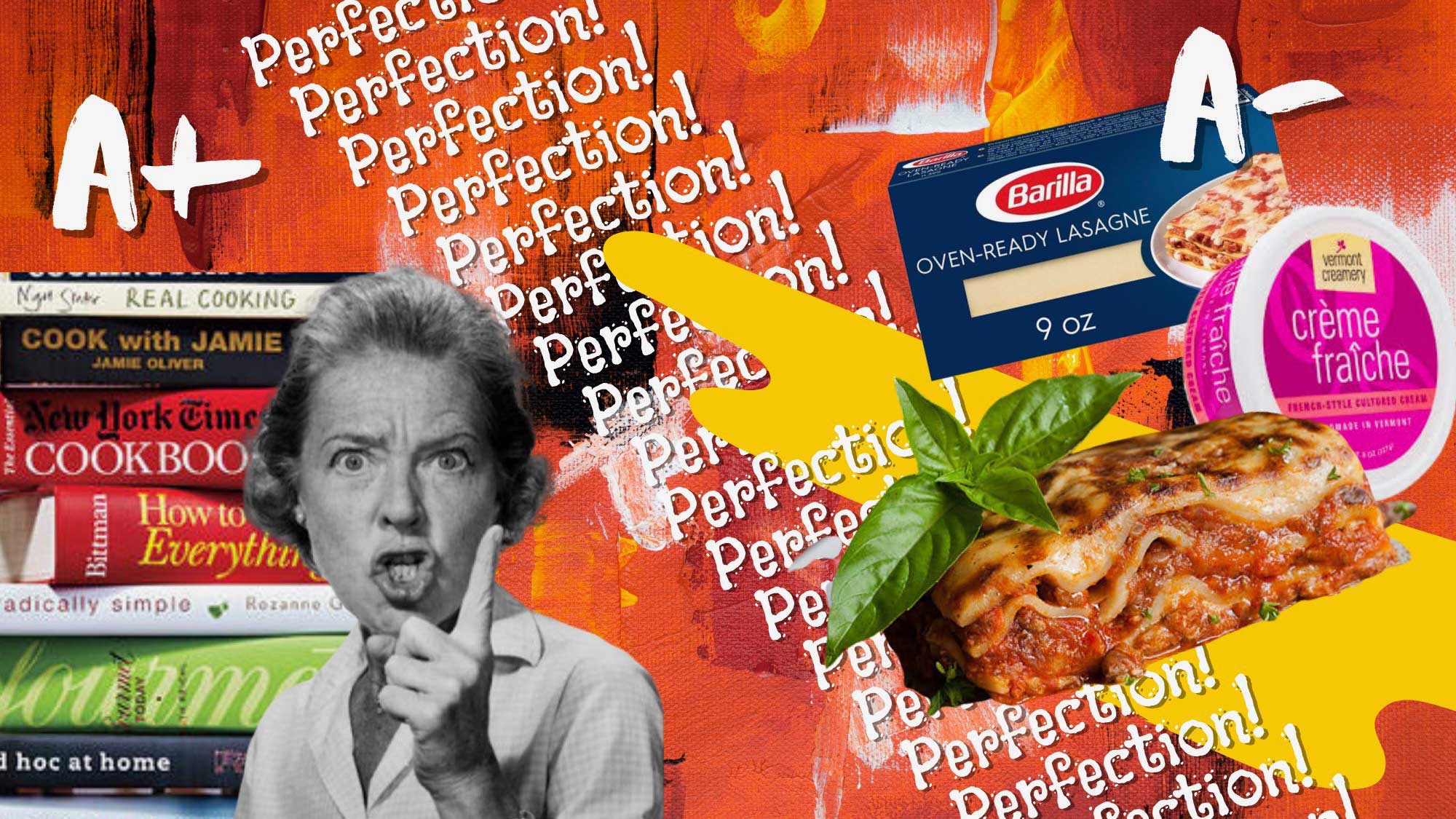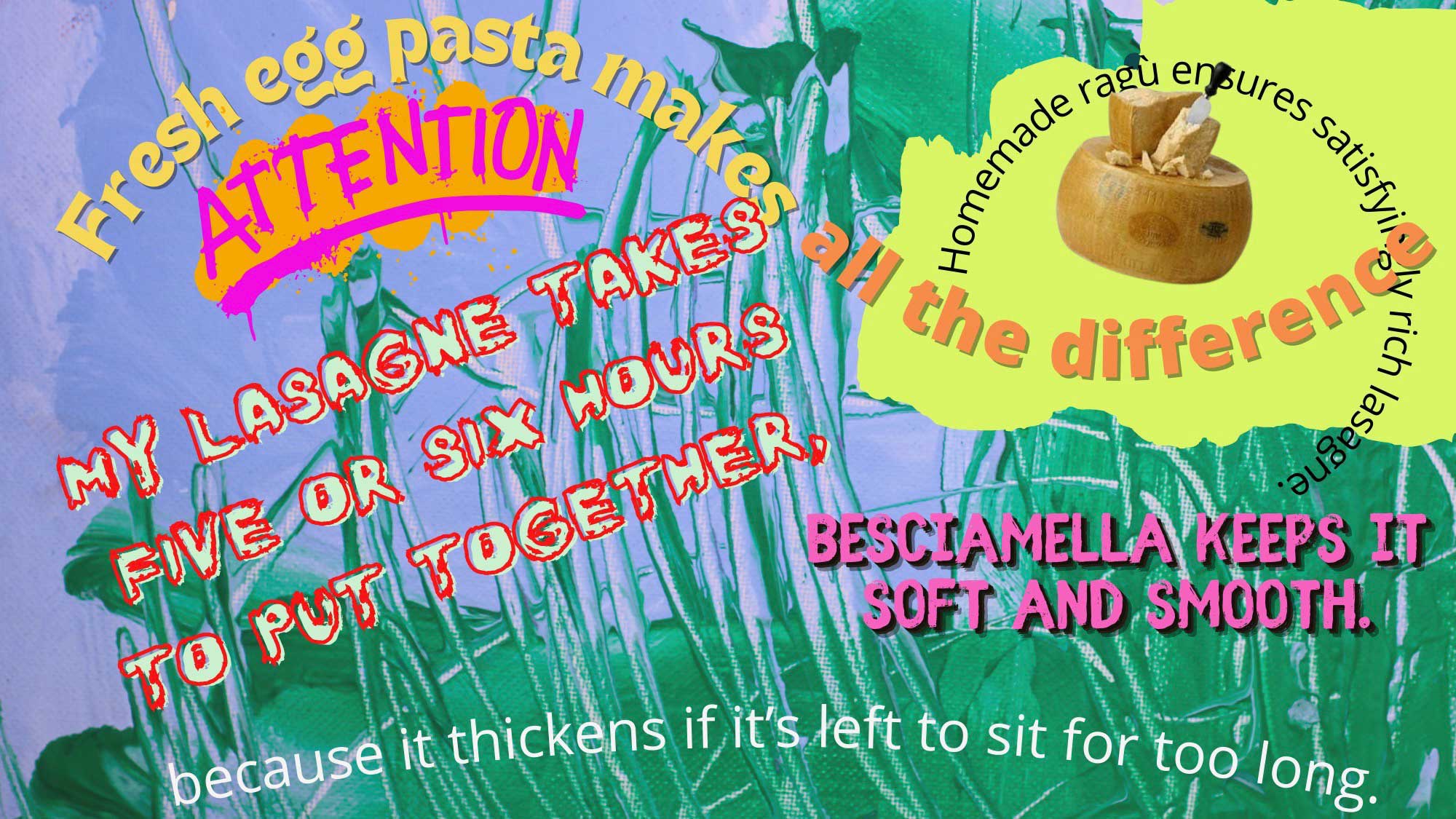
Learning to Love the A Minus
Or, How the Pandemic Kicked My Kitchen Perfectionism to the Curb
I used to spend a lot of time cooking from scratch. Bread, noodles, pastry … you name it.
Bonus points if a recipe was labor-intensive and called for ingredients that required me to drive to at least three different markets across town to acquire them. And, I have to say: My cooking was awesome. I was making 5-star restaurant quality food from my humble home kitchen, A+ meals that required hours of blood, sweat and tears, with a sprinkle of fennel pollen on top. Guests would routinely look up from their first bite and moan, in a combo of ecstasy and thanksgiving, “Oh, God. This is good.”
Then, a global pandemic hit, and, quite suddenly, schlepping to multiple markets to procure various obscure ingredients revealed itself to be both personally unsafe and civically irresponsible. Sure, I still had to get groceries for my family, but these trips became bimonthly operations conducted with military-style precision: mask on tight, grocery list in hand, items listed in the order I would encounter them at Publix, starting with apple juice, which my son drinks by the gallon.
If you had dinner at my house Before Pandemic (B.P., circa March 2020), I probably served you my A+, entirely-from-scratch lasagna Bolognese. This involved not only battling Atlanta traffic to get to the Italian specialty shop to purchase Tipo 00 flour (only the best for my guests), but also hours devoted to making, rolling, and pre-boiling the noodles, not to mention patting them dry with a dishtowel once I pulled them from the water.
Then there was the ragù, which required my hand-chopping both beef brisket and pork shoulder, along with pancetta, all procured from an entirely different specialty market on the other side of Atlanta (battling even more traffic), and then browning the meat with onions, carrots and celery, before adding tomatoes, wine and stock (extra credit for homemade), bringing the whole thing to a boil, and then bringing it back down to a simmer, and stirring occasionally. An hour later, I would add whole milk, and continue the occasional stirring, (okay, let’s be serious, stirring every 20 minutes throughout the day), checking to see if there was enough liquid in the braise, or too much liquid, tasting to see if it was salted enough, or, God forbid, over-salted, in which case I would peel a potato, chop it up, and throw the pieces into the sauce in order to soak up any excess saline before fishing out the potato chunks once they’d done their job.
And about that béchamel … my lasagna recipe called for a double batch (of course). That’s a whole lot of milk to thicken by virtue of whisking it into cooked flour and butter. Sure, the directions said that the white sauce should come together in ten minutes or so, but I usually spent a good half hour at the stove, furiously stirring away, growing increasingly desperate that it was never going to thicken, until that final moment when the wire whisk began to leave trails in the bottom of the saucepan and I knew — praise God! — that it was ready.
I was making 5-star restaurant quality food from my humble home kitchen, A+ meals that required hours of blood, sweat and tears, with a sprinkle of fennel pollen on top.
Now, you’re thinking, Susan, isn’t this done by now? Oh, no! I still had to lovingly layer the pre-boiled noodles with the ragù, béchamel and Parmesan cheese, which, you better believe, I grated myself — no slacker pre-grated tub from Whole Foods for me! And then the final step, dotting the top of the casserole with little bits of butter. (True confession: I’ve actually made homemade butter before, but let’s not go overboard here…) Look, I was playing the part of Gracious Southern Woman, born to entertain. By the time my guests arrived, the kitchen counters would be clean, the salad greens washed, the vinaigrette prepped, the table set with white plates, linen napkins, and sterling silver flatware in the Fairfax pattern, homemade cheese straws at the ready, the house fragrant with the smell of the lasagna bubbling away in the oven, only the merest hint of mania and exhaustion in my eyes. Sure, in the days leading up to this dinner, I had type-A’ed myself into a flour-covered frenzy in the kitchen – but I was convinced the otherworldly results made it all worth it.
Or maybe I really just wanted to be admired, held in high esteem, fortressed by my presentation of perfection, so that no one would be privy to my many insecurities and vulnerabilities.
To be honest, I still admire those who engage in timeless culinary arts, but the pandemic caused a distinct change in my cooking habits. While I once prided myself on my relentless devotion to culinary purity – regardless of the time such purity required – I’ve lost the urge, perhaps forever. I simply don’t have enough time. (Honestly, I’m not sure if I ever did.) There’s a son to co-parent, a democracy to fight for, books and articles to be written, taxes to file, a house to help keep clean, Session meetings to attend, friends and family to visit. Sometimes I even try to get in a little exercise! And so, life After Pandemic (A.P.) simply doesn’t allow for anything more than the bare minimum when it comes to food preparation. Think: a sheet pan filled with diced root veggies tossed with olive oil and salt, slid into a hot oven till done, then topped with a couple fried eggs. Think: pimento cheese sandwiches and apple slices.
Still, even my newfound minimalist cooking ethic does allow for some special occasion meals, like the one I made recently for my husband, on a glorious Saturday night in October when my son was spending the night with his grandparents. My husband loves my lasagna, so I made him an A.P. version, which took about 1/5th the time to prepare, and is at least 90 percent as good as the original. (And an A- is a really good grade, right? Right??)

Did you know that Barilla makes excellent no-boil noodles, and that even their gluten-free version is good? Did you know that you can buy pre-ground meat from the grocery store?! Did you know that you can prepare a ragù in a slow cooker, no stirring required? And please don’t tell the purists — but I have discovered that purchased crème fraiche mixed with a little heavy cream makes a fine substitute for béchamel.
It’s kind of a miracle. I wasn’t nearly so tired when the lasagna was ready, and if my husband missed the homemade noodles, he sure didn’t mention it while helping himself to seconds and then thirds. Could it be that an A-, or, Lord, maybe even a B+, is a perfectly acceptable grade?
Maybe there’s something else at play here, a growing understanding that perfectionism is a trap, a way of trying to steel ourselves against human vulnerability. The truth is, whatever polished, Southern armor I might choose to put on, I’m still vulnerable: vulnerable to a global pandemic, vulnerable to bad government, vulnerable to being complicit in inequitable systems, vulnerable to growing old, to which my reading glasses, silver hairs, and achy hip attest.
In the early days of the pandemic, some liked to say that Mother Nature had sent us to our rooms so that we might think about what we’d done to the earth and to each other, warning us not to come out until we had shaped up. While I believe humans have a lot to answer for, I find the idea of Covid as an intentional “lesson” troubling — for starters, the houseless among us don’t have a room to go to, and I don’t believe a sentient, intervening “Mother Nature” would be so cruel as to overlook that. That said, I do believe that the pandemic, though not divinely orchestrated, has generated plenty of lessons for the taking, including:
- Perfectionism is a trap.
- Endless consumption is a trap.
- An A+ is never required.
Indeed, it is only when we allow the armor to slide off, when we reveal our fleshy, imperfect selves, that we open ourselves to true experiences of love and connection.

Susan Rebecca White is the author of four novels: Bound South, A Soft Place to Land, A Place at the Table, and We Are All Good People Here. Her essays and nonfiction have been published in The LA Review of Books, Tin House, Slate, Salon, The Bitter Southerner, and elsewhere. She lives in Atlanta with her husband and son. Visit her at susanrebeccawhite.com
If you'd like to write a response to — or an amplification of — this story, all you need to do is hit the Submissions button below. This is how civil conversation works.
